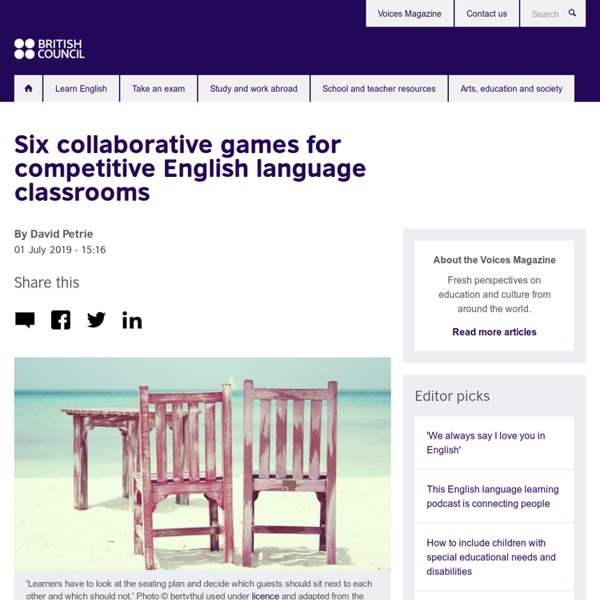Language Games for Teaching and Practicing Vocabulary.
Topic: Language games Skill: Vocabulary Grade: Primary or Young Learners. Learning a language requires a great deal of effort. Games help students to make and sustain the effort of learning. Games provide language practice in the various skills – speaking, writing, listening and reading. They create a meaningful context for language use.
Future learning
Support for teachers during the Covid-19 pandemic To support teachers during the Covid-19 pandemic, there are two versions of this lesson plan – one specifically for online lessons and one for face-to-face classrooms where physical distancing procedures are in place, although it can be used in any face-to-face teaching context. Introduction In this lesson learners are provided with an opportunity to think about how schooling may change in the future. They work with pictures showing two different children, predicting what they might see around them and comparing the full scenarios. They imagine what learning is like in the future for the children in the pictures and write about it, then think about how learning might really change.
An Engaging Word Game Helps Students Grasp Implicit Bias
As part of an effort to demonstrate the effect of implicit bias, library media specialist Jacquelyn Whiting devised an exercise that looks similar to “Mad Libs,” the popular fill-in-the-blank word game. In EdSurge’s “Everyone Has Invisible Bias. This Lesson Shows Students How to Recognize It,” Whiting describes how she removed words from a New York Times opinion essay to create a new, highly engaging activity for a 10th-grade class. Jacquelyn Whiting Whiting removed key words from the essay to create a paragraph for students to fill-in-the-blank.
21 Free fun Icebreakers for Online Teaching and virtual remote teams
Last Updated on September 13, 2021 Here are 21 free to use icebreakers for online teaching that you can use. Icebreakers are an important part of any training program, as they encourage people to participate from the start of a session, to get to know each other and to feel comfortable working with others. How do you run icebreakers for online sessions though? We have written a separate post on ‘How to run group activities in virtual classrooms for your students here.
50 Educational Brain Breaks that Your Students Will Love!
33. Clap on, clap off When you say “clap on,” kids clap their hands vigorously together. When you say “clap off,” they stop as quickly as they can and freeze. Or follow along with this fun video.
Ten ways to learn new words as a language learner
Teacher and teacher trainer Svetlana Kandybovich, our latest TeachingEnglish blog award winner, shares her top tips for remembering new words. As a language learner, you work hard to expand your vocabulary. You plough through new words every day, make long lists of words and practise with flashcards.
Creating Mobile Worksheets with QR Codes
Published 14 September 2017 Nik Peachey continues his digital teaching series by exploring how QR codes can be used to create mobile worksheets. He provides simple steps to help you create them, plus a fun lesson activity download too!
most-misused-phrases-words-english-language-uk-revealed-to-be-pacific-a8098791
New research has revealed the 30 most commonly misused phrases in the UK. Known as eggcorns, the bizarre phrases often carry entirely different – and often hilariously nonsensical – meanings. Scrivens Opticians & Hearing Care surveyed 2,000 British adults and found that 35 per cent of them used eggcorns without even realising they were saying something incorrectly. Common examples of eggcorns include: “curve your enthusiasm” (instead of “curb"), “escape goat” (instead of “scapegoat”) and “biting my time” (instead of “biding”), reports The Sun.
20 Fun Zoom Games for Kids - We Are Teachers
Making the switch to online learning can be a big adjustment, but just like in-person school, it can’t be all work and no play! Here are 20 fun Zoom games for kids that you can use to take a break from the traditional curriculum and keep kids engaged. 1.
Highly delighted, bitterly disappointed, ridiculously cheap: adverbs for emphasis.
[by Liz Walter] We often make adjectives stronger by putting an adverb in front of them. The most common ones are very and, for a stronger meaning, extremely: He was very pleased. The ship is extremely large. However, we don’t use very or extremely for adjectives that already have a strong meaning, for example fantastic, delighted, huge, furious.
Actively Learn - A Huge Resource of Ready-Made Interactive Learning for English Language Learners
Actively Learn isn’t just a great source of learning content for grades 6 through to 12, though if you are teaching adult learners much of the grade 12 content would still be appropriate. It’s also an LMS that enables you to create and track the use of learning materials across your classes, and a teacher development tool that enables you to train teachers in aspects of materials development and instructional design. Ready-Made Content for ELA Actively Learn already has a really substantial amount of readymade interactive learning content when you log in. The content is easy to browse or search, initially by subject (ELA, Science or Social Studies) and then by a range of different parameters, from grade to topic to theme or genre. Once you have found some interesting looking content for your students you can click through to see the activities that have been designed for it and the guidance notes for the teacher.
Worksheet-free Vocab Revision Activities – Clare's ELT Compendium
What do you do in those last 5 minutes of class when you’ve finished everything that was planned? Or when energy levels hit a low during a lesson? Or in that lull while the next student gets ready to present, or whatever?



